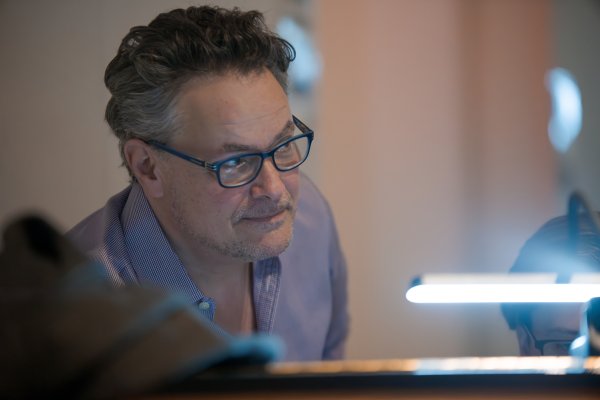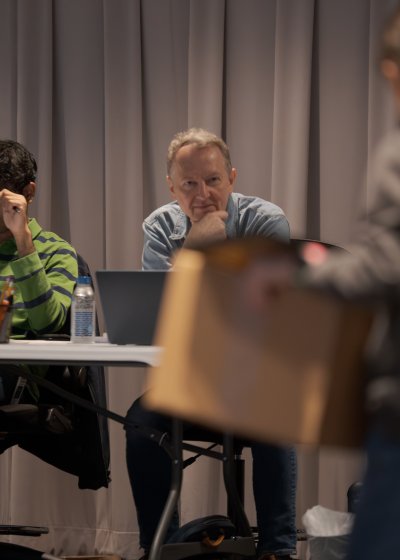
The death of a parent never comes at a good time. For composer and lyricist Adam Guettel, it happened early on in the development process of Millions, and was almost absurd timing.
He’d gotten the urge to talk to his mother early one morning while waiting for Millions book writer Bob Martin to come downstairs so they could continue working on the show. He called and her personal assistant answered the phone.
“I said, ‘Hey, Bill, how’s she doing today?’ And Bill goes, ‘Well, she’s — hold on. She’s... she’s dead. She just died,’” he says. “She died at the moment I called. Talk about comedy and how it works. You have to see the absurdity in that moment.”
As Guettel processed the loss of his mother, Mary Rodgers — daughter of Richard Rodgers of the iconic composing team Rodgers and Hammerstein — he infused it into the work, using the show’s development process as an almost cathartic way of grieving. After all, she directly influenced his love of music, being a composer in her own right.
“I think it made the score quite, quite beautiful,” says Martin. His loss also made Guettel connect to the piece’s central characters a little more, as the entire story pivots around grief and how two boys mourn the loss of their mother. When a bag of money seemingly falls from the sky, the boys grapple with how to handle it. The younger, Damian, thinks that it’s a gift from her and insists that they give it away, but the older, Anthony, decides that they should invest it or pay their bills with it.
"It's a comedy with an enormous heart."
This moral dilemma that the boys deal with in deciding what to do with the money they’ve found is an extremely challenging central point for a musical — especially a show that’s supposed to be a comedy and also enjoyable for the whole family — but Martin muses that he loves the “sort of absurd take” of balancing a show on the precipice of an ethical problem.

“I always like to ground [a comedy] in something real and painful,” Martin continues. “That’s how comedy should work in literature, basically to help us process pain. … It's rare that I get a chance to deal with very, very big issues in a comedy, but it’s a comedy with an enormous heart.”
However, the musical is in good hands, as both Martin and Guettel are very familiar with working on shows that tackle huge subjects. Guettel, for instance, just opened a new Broadway production of his musical Floyd Collins, a gripping and powerful story about a cave explorer trapped in a cave in Kentucky. Guettel is also known for the stunning music and lyrics of The Light in the Piazza and Days of Wine and Roses. Martin is also no stranger to the Alliance, having co-written the book for The Prom, which premiered on the Alliance Stage in 2016 and told the story of a young queer girl simply asking for acceptance. He also worked on the books for two shows currently running on Broadway — Smash and Boop! The Musical.
Guettel enjoys the challenge the show offers, calling it “really brilliantly funny.” He thinks the success of the show will lie with everyone who takes part in the development of the show. “If I can find people who are willing to take something like [this] on,” he says, “we are automatically differentiated from most of what is going on right now, not only on Broadway, but in culture and in general. Great art has love at the center of it.”
The team director Bartlett Sher (To Kill a Mockingbird, The Bridges of Madison County, The Light in the Piazza) has pulled together certainly rises to the challenge. In addition to Martin and Guettel, Sher has recruited an incredible team of designers he’s worked with in the past, including costume designer Catherine Zuber (Moulin Rouge!, My Fair Lady, The King and I), scenic designer Michael Yeargan (Oslo, South Pacific, The Light in the Piazza), and lighting designer Donald Holder (The Lion King, South Pacific, She Loves Me).
"It's landing at the right time."
Martin adds that the show is, at its core, a “sly effort to explore faith, why it exists, how we can understand the nature of human suffering, and whether faith is the byproduct of that.”
“I think it’s always a good time for a story like this,” he continues. “But we have to honor the weight and the beauty of that. … [Right now,] we as a society are trying to remember what’s important and how we should treat people. We’re really battling in the same way Damian is — we’re sort of struggling with what it means to be a good person more than ever. It’s landing at the right time.”
Find more information about Millions here.




